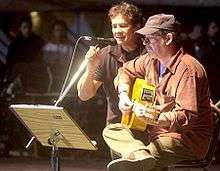Victor Heredia
Víctor Heredia (born 24 January 1947, in Buenos Aires) is an Argentine singer songwriter. Author of Taki Ongoy, a symphonic work about Taki Ongoy, a millenarian movement against the Spanish conquest.
Víctor Heredia | |
|---|---|
 | |
| Background information | |
| Birth name | Víctor Ramón Cournou Heredia |
| Born | 24 January 1947 Buenos Aires, Argentina |
| Genres | Folk music |
| Occupation(s) | Singer |
| Years active | 1968–present |
Biography
He was born in the neighborhood of Monserrat, in the city of Buenos Aires, though he grew up in Paso del Rey, a city in the Moreno area of Greater Buenos Aires. His paternal family is of French origin, whereas his maternal grandmother was of Capayán indigenous origin, born in the Calchaquí Valleys, in the province of Catamarca.[1] When he was young, he won the newcomer's prize in the Cosquín Festival. Many of his songs address what he see as the social problems in Latin American and various human rights issues. In 1972 the singer turned into the first argentine entrant in the first edition of the OTI Festival which was held in Madrid. His song "Sabes que estamos aquí América (You know we are here America) ended last in a tie with other four entrants, his talent didn't go unnoticed. He has recorded with various artists, such as Joan Manuel Serrat, Mercedes Sosa, León Gieco, Milton Nascimento, el Cuarteto Zupay [the Zupay Quartet], Silvio Rodríguez, and Pablo Milanés, amongst others.
He was banned during the military Argentine dictatorship, which started in 1976. This dictatorship left an estimated 30,000 (7,000 documented and identified by name <https://web.archive.org/web/20170329045510/http://www.jus.gob.ar/derechoshumanos/areas-tematicas/ruvte.aspx> ) missing persons including his sister, Maria Cristina. Heredia collaborates closely with organizations that denounce the crimes of the dictatorship, such as the Mothers of the Plaza de Mayo and the Grandmothers of the Plaza de Mayo, and also with organizations of indigenous peoples.
His works include Todavía Cantamos ("Still We Sing"), Sobreviviendo ("Surviving"), El viejo Matías ("The old man Matías"), Dulce Daniela ("Sweet Daniela"), and Razón de vivir ("Reason to live"). His albums include Taki Ongoy, a conceptual work composed in 1986 in homage to Taki Ongoy, an indigenous movement that arose in the sixteenth century (1560–1572) in opposition to the Spanish invasion.
Prizes
- Winner of the Viña del Mar International Song Festival in 1994.
Discography
- Shouting Hopes, 1968 (Gritando Esperanzas)
- Víctor Heredia, 1969
- The Old man Matías, 1970 (El Viejo Matías)
- Where I come from, 1971 (De Donde Soy)
- Reasons, 1973 (Razones)
- Víctor Heredia Sings Works by Pablo Neruda, 1974
- Drink from my Water Jug, 1975 (Bebe En Mi Cántaro)
- Paso Del Rey, 1976 (Paso Del Rey)
- When I Say Woman, 1977 (Cuando Yo Digo Mujer)
- That Beautiful Song, 1978
- Already You Can See It, The Day is Dawning, 1981
- Opened doors, 1982
- Recital, 1982
- Víctor Heredia Canta Paul Neruda (new version), 1983
- Those Little Lead Toy Soldiers, 1983
- I Only Want to Live, 1984
- Courage!, 1985
- Taki Ongoy, 1986
- A Day of Grace, 1987
- Memory, 1988
- Letter From A Shipwrecked person, 1991
- Meanwhile, 1992
- Syndrome Of Love, 1994
- Víctor Heredia Live from The Back-room, 1995
- Of Love and Of Blood, 1996
- Footprints(or Marks), 1998
- RCA Club – Víctor Heredia, 1998
- Live Heredia 1 and 2, 2000
- Then, 2001
- Phoenix, 2003
- Tenderly Friends, 2005
- Citizen, 2008
References
- Vitale, Cristian, Victor Heredia vuelve a hacer "Taki Ongoy", veinte años después., Trovacub, 2006.